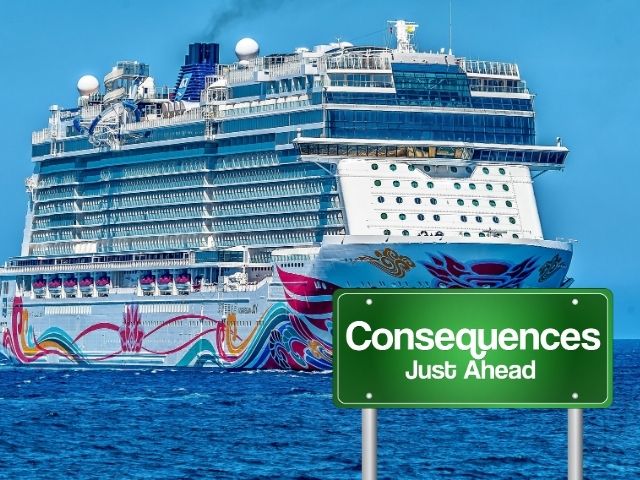
Recently, news agencies around the world reported about the cruise passengers “stranded” by their cruise ship during a tour. I put stranded in quotation marks for a couple of reasons.
One, from Business Insider to Today.com and ABCNews.com, and even 9News in Australia, every headline contained the three same words: “cruise passengers stranded.” That last word, stranded, is highly inflammatory and implies culpability on the ship’s part. Which leads to the second reason.
While “stranded” is an accurate term for what happens when you miss all aboard time, it’s also the reality of cruising. You miss the ship, you get left behind. It’s why you don’t miss the ship!
Cruise Passengers Stranded by the Norwegian Dawn
Eight Norwegian Dawn passengers were “stranded” in the African island nation of São Tomé and Príncipe after their private tour failed to get them back to the ship for the 3:00 pm all-aboard time.
The keyword there is private tour. For non-cruisers, you can either book tours through the cruise line, or arrange your own tours.
While private tours are often cheaper, they’re also risky. As the tourgoers in this case found out. The ship has to wait for you when you book tours through them. Cruise lines are very clear that if you make your own travel arrangements and don’t get back on time, they will leave you.
It’s not unheard of to see “pier runners” dashing to try and get back on the ship. Fellow passengers often stand at the rails laughing and egging them on. However, it’s been a while since we heard a travel horror story like this one.
In the case of the Norwegian Dawn cruisers, it proved a costly mistake. It’s taken them a lot of time, money, frustration, and travel through six different countries, to try and rejoin their ship.
That’s why Wayne and I, frugal as we are, often book tours through the ship. Especially if it involves lengthy travel from the port to a certain sightseeing destination. For example, when we docked in Le Havre, France, and wanted to go to Normandy, or when we docked in Laem Chabang, Thailand, and we wanted to go to Bangkok. We could’ve figured out the logistics on our own to get where we wanted to go, but it was safer doing it through the cruise ship. We didn’t want the hassle, panic, and stress of potentially getting left behind. Not worth it.
Consequences and Unfortunate Realities
I’m not sure if the other six people in the stranded group are reaching out to the media as much as the American couple from South Carolina is. But it seems the Americans are the driving force behind this story making news.
Partly because one of the members wasn’t on the tour. They suffered a stroke and were left behind. That is another unfortunate reality we’re familiar with from cruising, although thankfully not from personal experience. But we have been on ships where people suffer injuries or health events, and the cruise ship left them behind.
It sounds wrong, and maybe it is, but it was so the passenger could get proper medical care. Ships aren’t equipped to deal with certain issues. Or, rather, they’re equipped to deal with them to a point. During our years of cruising, we’ve seen instances where people suffer heart attacks and are removed at the next port. The ship can’t wait indefinitely in port for days to see if they’ll be better enough to rejoin the cruise. They have a schedule to keep.
And, again, every cruiser signs a cruise contract prior to boarding. It’s very clear about guest responsibility. The cruise has a certain duty to guests, but so do guests to the ship and their fellow cruisers. Part of that is returning to the ship on time.
Policies and Personal Accountability
Which, in the stranded group’s defense, they did make an effort to contact the ship when they noticed they might run late. And the Coast Guard did try to ferry them out to rejoin the ship, but the ship refused to let them board.
Which might sound harsh, but think about it from the cruise line’s perspective. They’re very clear that if you don’t board when you’re supposed to, you’ll have to find your way to the next port to get back on board. That’s a policy they have to stick to. Think of the inconvenience and danger to both crew and guests of making exceptions and reboarding latecomers at sea. No. That sets a bad precedent.
The moral of this travel horror story is accountability. It’s why you absolutely never miss the all-aboard time, and if you do, don’t expect people to make exceptions. Airlines don’t. Trains don’t. Cruise ships shouldn’t be expected to either.
Addendum (added April 3, 2024)
I realized after I posted this that I didn’t explain why the stranded passengers ended up traversing six countries to rejoin the cruise ship. I also realized I didn’t include the quote that really set me off about the passengers complaining about what happened.
Perfect Storm of Hiccups
The guests ended up spending several days trying to figure out where and when to rejoin the ship. I think there may have been one or two sea days that prevented a reunion. (For those unversed in cruise-speak, a sea day is just what it sounds like. Where the ship spends the whole day in open water, not docking anywhere.)
The group then headed for Gambia, where they planned to rejoin the ship in Banjul. However, the ship wasn’t able to make its scheduled arrival there due to “adverse weather conditions” and “tidal restrictions.”
The next port they could re-board at would be Dakar, Senegal. Hopefully they did, but the American couple wasn’t sure they really wanted to. (I don’t see how they have a choice. Don’t they want to get their luggage and stuff back?)
Anyway, their experience is a horror story for sure. A true perfect storm of hiccups. But, again, this is why you don’t miss the all-aboard time. Sometimes it happens that the ship can’t stop at a scheduled port for one reason or another. (Usually weather, but sometimes political unrest, natural disasters, etc.)
And you definitely don’t want to miss the boat if the next day is going to be a sea day. Although, that does give you more time to get to the next port.
An Entitled Karen
Jill Campbell, one of the Americans who got the media involved in this debacle, said, “After what we witnessed, we truly believe that although there’s a set of rules or policies that the ship may have followed, they followed those rules too rigidly. I believe that they really forgot that they are people working in the hospitality industry and really the safety and well-being of the customers should be their first priority.”
Quit being such a Karen, Jill. The cruise line has rules and policies for a reason. Sure. Some are bendable. But for little things. I stated above why being flexible with boarding times can’t be one of them. Imagine if this story got out in the reverse scenario. That the ship had made accomdationis to get them back on board. All-aboard time would mean nothing. Cruisers would take advantage. No, no, no. The cruise line absolutely has to follow that rule “too rigidly.”
And again, by signing the cruise contract, she agreed to those rules and stated she understood the consequences if she failed to uphold her responsibilities. These are the consequences. Now she has to deal with them.
That’s why you DON’T MISS THE ALL-ABOARD TIME. Capiche?
Courtney Mroch is a globe-trotting restless spirit who’s both possessed by wanderlust and the spirit of adventure, as well as obsessed with true crime, horror, the paranormal, and weird days. Perhaps it has something to do with her genes? She is related to occult royalty, after all. Marie Laveau, the famous Voodoo practitioner of New Orleans, is one of her ancestors. That could also explain her infatuation with skeletons.
Speaking of healing, to learn how she channeled her battle with cancer to conjure up this site, check out HJ’s Origin Story.

Yeah, I call foul, too.
Oh my goodness, Priscilla, you surprised me! I wasn’t sure if you would comment (thank you for doing that btw), but also I did wonder last night as I posted this if you did comment, would you have one of your astute insights to add that I wasn’t considering. Because you do that so often. I get all riled up about something with tunnel vision and you offer a different view in that gentle way you have. lol